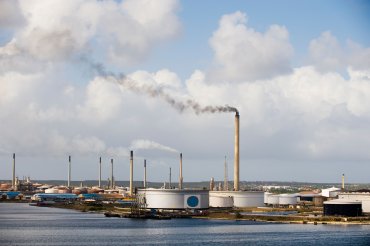
Curacao officials are again making rounds with potential partners interested in managing and modernizing the countrys Isla refinery, the government announced last week, almost two months after being spurned by a preferred bidder to take over its operations.
In a press release issued April 4, the refinery stated its Project Management Organization – in charge of the search for a new operator – began visits to prospective partners, with the first meetings to be held in the United States and England. Since 2013, the Curacao government has searched for a new operator to take over the plant when struggling Petroleos de Venezuela S.A.’s lease runs out at the end of 2019.
The organization will continue visiting other potential companies once the initial round of visits has concluded. The refinery said its goal is to create a shortlist by the end of April, with site visits to take place during May and June. Companies must enter a non-binding proposal during July.
In December, Curacao media reported Houston-based Motiva Enterprises was the refinery’s preferred bidder. Motiva, wholly owned by Saudi Aramco, refused to confirm or deny the report at the time. The preferred bidder withdrew from negotiations after a corruption probe into the selection process was launched, citing a delay in negotiations and the refinery’s review of other opportunities.
Marcelino de Lannoy, head of the refinery’s negotiation team, told Lube Report that the probe has concluded. The conclusion is that no fees were transferred for preferential treatment of any kind, he said. However, the conduct of a total of three workers was deemed not in accordance with the company rules of conduct. These workers were dismissed, and the rules, policies and procedures were improved to prevent the same.
De Lannoy said that the current shortlist was created from new bids. In February, refinery Process Specialist Arthur Gevers told Lube Report the refinery was consulting with London-based IHS Markit and had a pre-selection of four companies to work with.
The refinery also said it would look into assisting PdVSA with procuring crude oil, stating that the Venezuelan company was responsible for the procurement of feedstock by providing its own or entering into a tolling deal.
Legal action brought on by ConocoPhillips halted refinery operations after the Houston-based company seized PdVSA assets, including crude oil for the Isla refinery. The two companies settled, and ConocoPhillips released the assets following a PdVSA payment, but other hurdles are yet to be cleared in getting crude oil to the refinery.
Venezuelan crude can only reach the refinery if the threats and risks for embargo and legal arrests are reduced, said de Lannoy. Shipping agents are not engaged due to the accounts receivables, poor discipline for payment and U.S. sanctions.
Sanctions against PdVSA also hamper the efforts to resume operations – de Lannoy confirmed that the refinery’s units are still down. What is hampering refinery operation is the sanctions and the financial situation and debts, he continued. Waivers can only be applied for by U.S. entities providing service or material, and corresponding banks.
The Venezuelan-owned oil company has operated Isla Refinery since Shell conveyed it to the Netherlands Antilles – now Curacao – in 1985.
Curacao is an island located in the southern Caribbean and is a constituent country of the Netherlands.
The Isla Refinery, located in Curacaos capital Willemstad, has crude oil production capacity of 335,000 barrels per day. The refinery includes a base oil plant that has capacity to produce 5,000 b/d of API Group I paraffinic base oils and 3,700 b/d of naphthenic stocks.